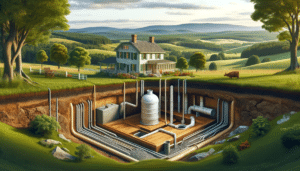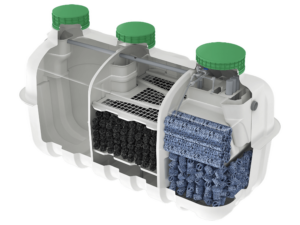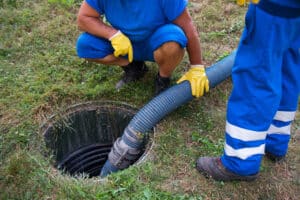Suffolk County’s Septic Improvement Program aims to improve the health of local waterways and restore a once thriving shellfish industry.
While many local residents are aware of the septic system upgrade program, some are unsure of the benefits or purpose.
Why is it important to upgrade septic systems? How do newer systems help the environment?
What’s the Problem with Old Septic Systems?
The biggest issue with outdated or conventional septic systems is that they discharge quite a bit of nitrogen. In fact, the average home septic system discharges 40 pounds of nitrogen per year.
With 74% of residents in Suffolk County relying on septic systems and cesspools, it’s not surprising that nitrogen levels are rising rapidly in waterways.
Excess nitrogen can damage water bodies by causing harmful algae blooms (HABs) and overgrowth of aquatic plants.
HABs have been a problem in Suffolk County since the 1930s. However, they are now reaching unprecedented levels, and their effects can be devastating. Not only can they clog up water intakes, but they can also deplete the oxygen in the water and prevent sunlight from reaching deeper waters.
The effects of excess nitrogen have resulted in fish kills and severely damaged the shellfish industry. In some cases, HABs produce algal toxins that can be harmful or even deadly to humans and pets.
For rooted aquatic plants, like those growing at the bottom of bays, the lack of sunlight and oxygen can be especially harmful. These plants serve as both a refuge and nursery for aquatic organisms.
HABs can also lead to beach closures, degrade the beauty of local waterways and even lower property values.
Antiquated septic systems and cesspools ultimately have a negative environmental and economic impact. While it may be impossible to completely restore local waterways to their former glory, steps can be taken to improve their beauty and health.
How Can a Septic System Upgrade Help?
Because the majority of Suffolk County homes rely on septic systems and cesspools, asking residents to upgrade septic systems can have a significant impact on nitrogen levels.
Innovative and Alternative systems – when properly designed, installed and maintained – can be effective alternatives to public sewer systems. Along with reducing nitrogen levels, these systems can also reduce or eliminate other contaminants, such as pharmaceuticals and volatile organic compounds (VOCs).
These systems also offer other benefits, such as:
- Cost effectiveness
- Fewer pump outs
- Modular components that are easily replaced when needed
- Increased property values
How Do Upgraded Systems Reduce Nitrogen?
Innovative and Alternative systems use biological processes to remove nitrogen.
- First, bacteria convert nitrogen to nitrite.
- Then, an anaerobic environment is applied to remove the oxygen molecule from the nitrate nitrogen.
- This allows the release of gaseous nitrogen out into the atmosphere.
By upgrading your antiquated septic system or cesspool, you’re doing your part to help restore and protect the local waterways. Grants and special financing options are available through the Septic Improvement Program, which can make the upgrade more financially accessible for local residents.










